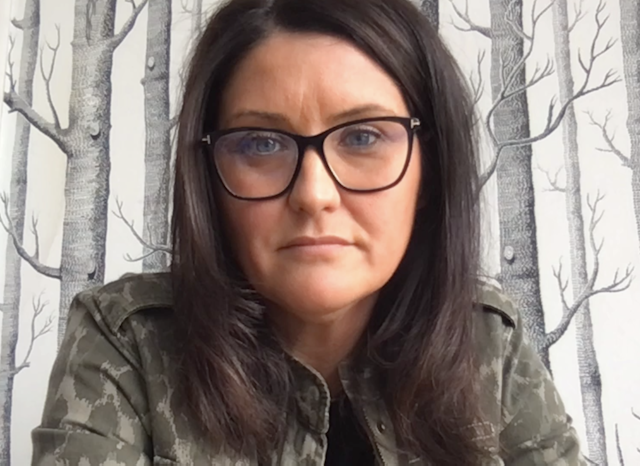To normalize mental health support, agency bosses have to show they’re vulnerable too
Mental health support isn’t much use if staff feel accessing it will damage their careers. To change that perception, Dentsu’s Fiona Lloyd advises leading by example.

Generalized anxiety disorder (GAD) is a common diagnosis in the UK / Unsplash
Late nights, porous work-life barriers and the pitching process all make advertising a particularly bad sector for the mental health of staff working in it.
33% of advertising industry workers are affected by stress or anxiety – double the UK national average – and according to the last All In census, a survey conducted by the Advertising Association published in March, 14% credit that directly to working in the industry. Data released by Nabs earlier this year showed that calls to its crisis helpline had jumped 35%; 66% were from people seeking guidance and help regarding mental health.
One solution, from the agency holding company Dentsu, is to provide additional paid time off in the form of annual ‘wellness days’, taken in addition to annual leave and sick leave. The idea is to provide staff with three days' worth of recovery time after a stressful project, pitch (or month) without the same requirements of advance notice that come with regular PTO.
Advertisement
Fiona Lloyd, global brand president at Dentsu media agency Carat, has been encouraging colleagues to take up all the time on the table.

“It gives you the flexibility to go: ‘I’ve been feeling it a bit this week, I’ve been up against it, and I really just need some time out for myself.’ People tend to do it off the cuff,” she says. In an act of solidarity with colleagues on World Mental Health Day (October 10) and to remind everyone that the option is available, most of Dentsu’s businesses in US, Canada, UK, China, India, Australia, Singapore took yesterday or today off as a wellness day.
But such an option isn’t much use if staff feel uncomfortable exercising it because their careers might suffer. Lloyd, however, wants to show that even senior agency leaders need to use such levers to manage their mental health.
Advertisement
‘I wasn’t right’
Earlier this year, Lloyd found herself taking a significant period of time off work. She tells The Drum: “I’ve always been somebody who’s incredibly resilient. But I was feeling very overwhelmed by the smallest of things. It was paralyzing. I couldn’t seem to move forward with anything. I recognized that… I wasn’t right.”
After a friend suggested she visit her doctor, she was diagnosed with generalized anxiety disorder (GAD). According to Mind, six in 100 people in England are given the same diagnosis each week.
When she brought the news to her boss, she was advised to take some time off. “They were incredible. They said: ‘You have to take time out,’ said the words even before I’d had a chance to say my doctors had told me I should take time off,” she recalls. Despite better awareness of the impact of work upon mental health and well-being, she says social stigmas still hold people back when discussing the subject.
“You feel guilty. I don’t think we’re good enough at talking about it. I think we can prepare people better for those types of conversations. Fear of failure, fear of being judged, all of those things stand in your way. So when the organization makes it easy, like they did for me… it was huge.”
Lloyds says the firm helped source a therapist – “uncharted territory” for the advertising veteran of 20 years – and “set me on the path to my recovery.”
She took two months off work to recover, an experience that changed how she approaches work, management and the need to give colleagues space and time to manage their mental health. Much of that time, she says, was spent learning about the brain chemistry behind her experience as a means of better arming herself. “I was intent on learning exactly what was happening with my brain… making the adjustments, setting the boundaries, all of those things that time away gives you the perspective to look at,” she says.
Suggested newsletters for you
‘I am still as ambitious as I was before’
And when she returned to work to staggered duties, Lloyd says she felt “in control” and ready to adapt her approach to working life. “My team stepped up – they were amazing while I was out – and I saw them really flourish from doing that. So there are [duties] that I have not taken back; now they’re empowered and have more responsibility.
“This is one of the things I’ve learned about vulnerability and showing vulnerability. I think as leaders, we’re programmed to make sure that we are fully in control and very polished. But actually, showing that vulnerability, you can get so much more out of a team. Saying, ‘I’m not in a really good place, can you help me out’ changes the dynamics of a team.”
“I’d encourage everybody now to just share that little bit of vulnerability,” she adds.
On reflection, she considers the experience to have made her a better leader. “It’s made me so much stronger. It’s made me so much more self-aware as a person. I am still as ambitious as I was before, but I’m more aware of myself and the conditions I need to do certain things.
“I don’t think it’s changed my trajectory but I’ll be much more aware of the environment that new roles or new opportunities within the organization would bring and how I would manage that and be very open about any concerns that I had.”

